Enhancing Quality Management: An Analysis of Airbnb in Hospitality
VerifiedAdded on 2023/01/13
|11
|3549
|89
Report
AI Summary
This report provides an executive summary of the quality management issues faced by Airbnb within the hospitality, tourism, and events industry. It identifies problems such as last-minute cancellations, overbooking, and discrepancies between advertised and actual services. The report then explores the application of quality management principles, including key performance indicators (KPIs) and total quality management (TQM), to address these challenges. It examines the evolution of quality management, from inspection to total quality management, and discusses the contributions of quality gurus like Deming and Crosby. The analysis highlights the impact of these issues on customer satisfaction and provides recommendations for improvement, emphasizing the importance of reliability, responsiveness, and assurance. The report concludes by summarizing the key findings and suggesting strategies to enhance Airbnb's service quality and customer experience.
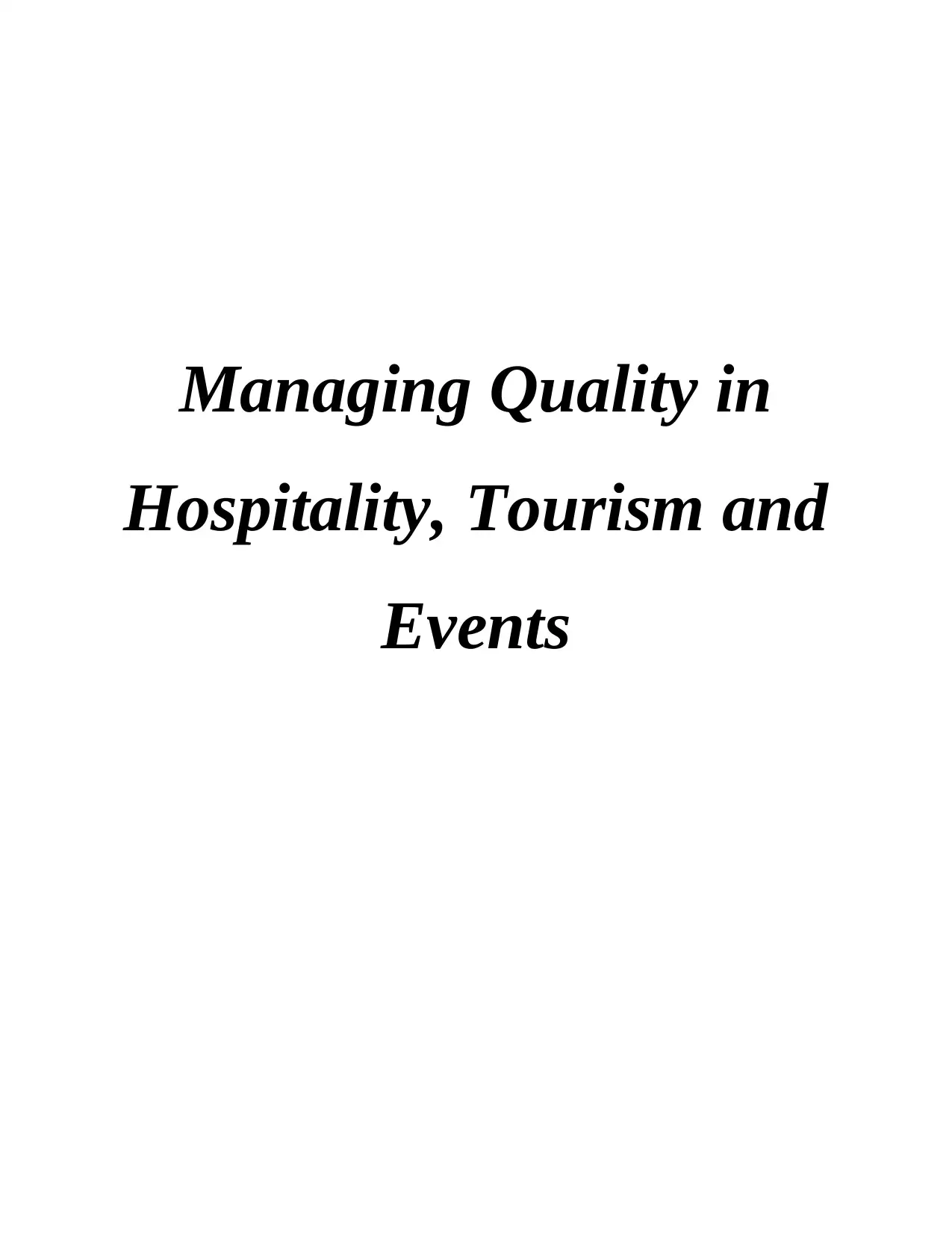
Managing Quality in
Hospitality, Tourism and
Events
Hospitality, Tourism and
Events
Paraphrase This Document
Need a fresh take? Get an instant paraphrase of this document with our AI Paraphraser
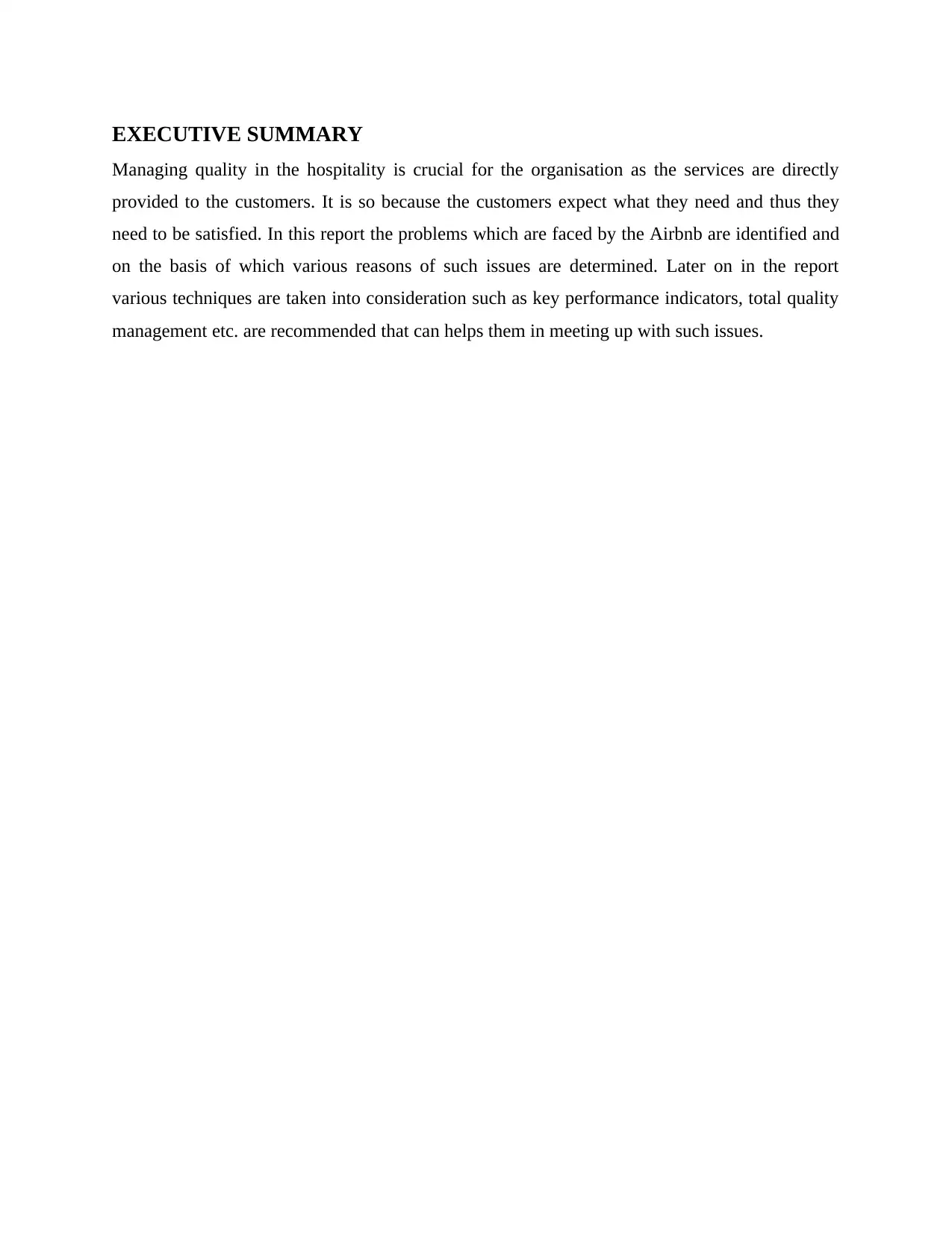
EXECUTIVE SUMMARY
Managing quality in the hospitality is crucial for the organisation as the services are directly
provided to the customers. It is so because the customers expect what they need and thus they
need to be satisfied. In this report the problems which are faced by the Airbnb are identified and
on the basis of which various reasons of such issues are determined. Later on in the report
various techniques are taken into consideration such as key performance indicators, total quality
management etc. are recommended that can helps them in meeting up with such issues.
Managing quality in the hospitality is crucial for the organisation as the services are directly
provided to the customers. It is so because the customers expect what they need and thus they
need to be satisfied. In this report the problems which are faced by the Airbnb are identified and
on the basis of which various reasons of such issues are determined. Later on in the report
various techniques are taken into consideration such as key performance indicators, total quality
management etc. are recommended that can helps them in meeting up with such issues.
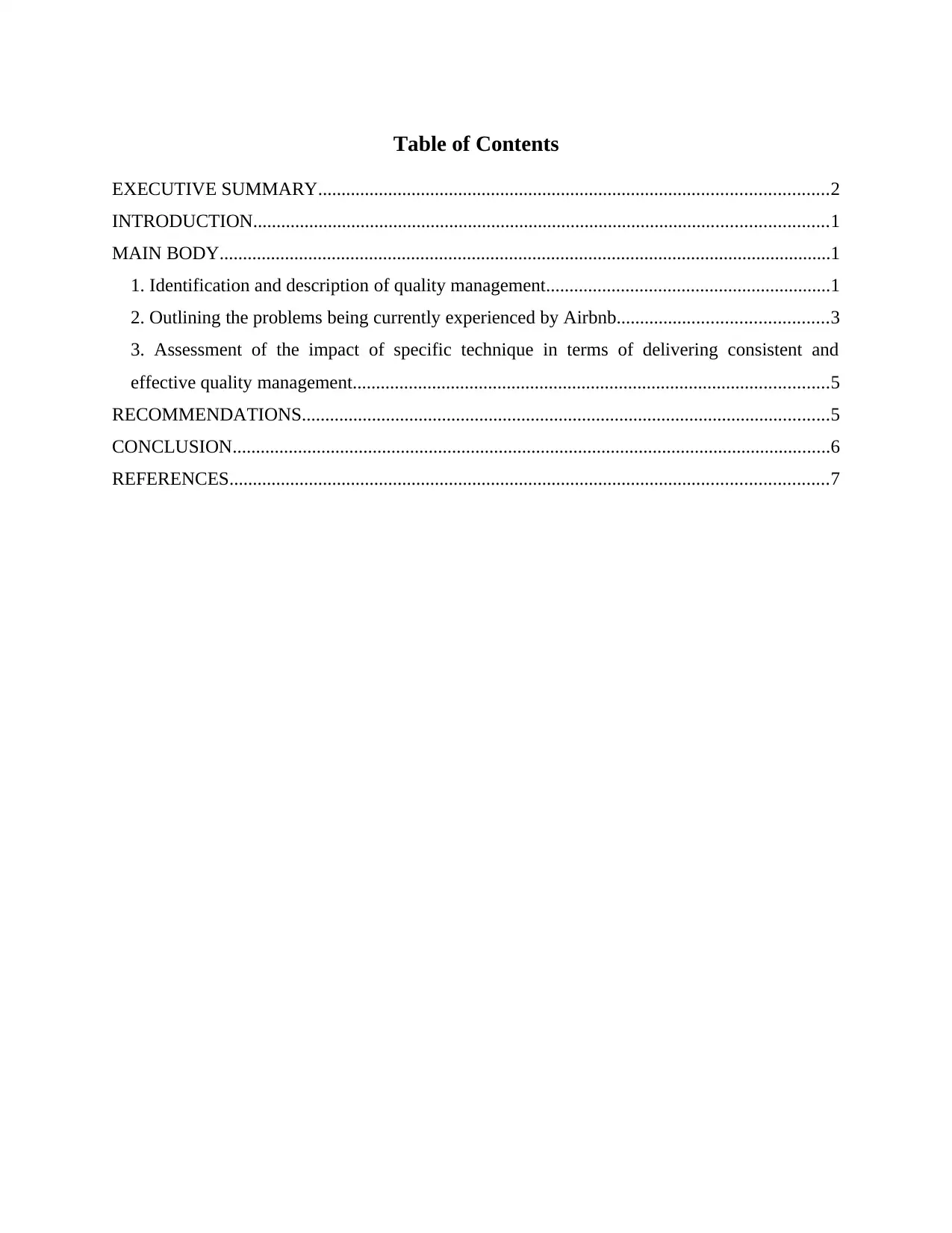
Table of Contents
EXECUTIVE SUMMARY.............................................................................................................2
INTRODUCTION...........................................................................................................................1
MAIN BODY...................................................................................................................................1
1. Identification and description of quality management.............................................................1
2. Outlining the problems being currently experienced by Airbnb.............................................3
3. Assessment of the impact of specific technique in terms of delivering consistent and
effective quality management......................................................................................................5
RECOMMENDATIONS.................................................................................................................5
CONCLUSION................................................................................................................................6
REFERENCES................................................................................................................................7
EXECUTIVE SUMMARY.............................................................................................................2
INTRODUCTION...........................................................................................................................1
MAIN BODY...................................................................................................................................1
1. Identification and description of quality management.............................................................1
2. Outlining the problems being currently experienced by Airbnb.............................................3
3. Assessment of the impact of specific technique in terms of delivering consistent and
effective quality management......................................................................................................5
RECOMMENDATIONS.................................................................................................................5
CONCLUSION................................................................................................................................6
REFERENCES................................................................................................................................7
⊘ This is a preview!⊘
Do you want full access?
Subscribe today to unlock all pages.

Trusted by 1+ million students worldwide
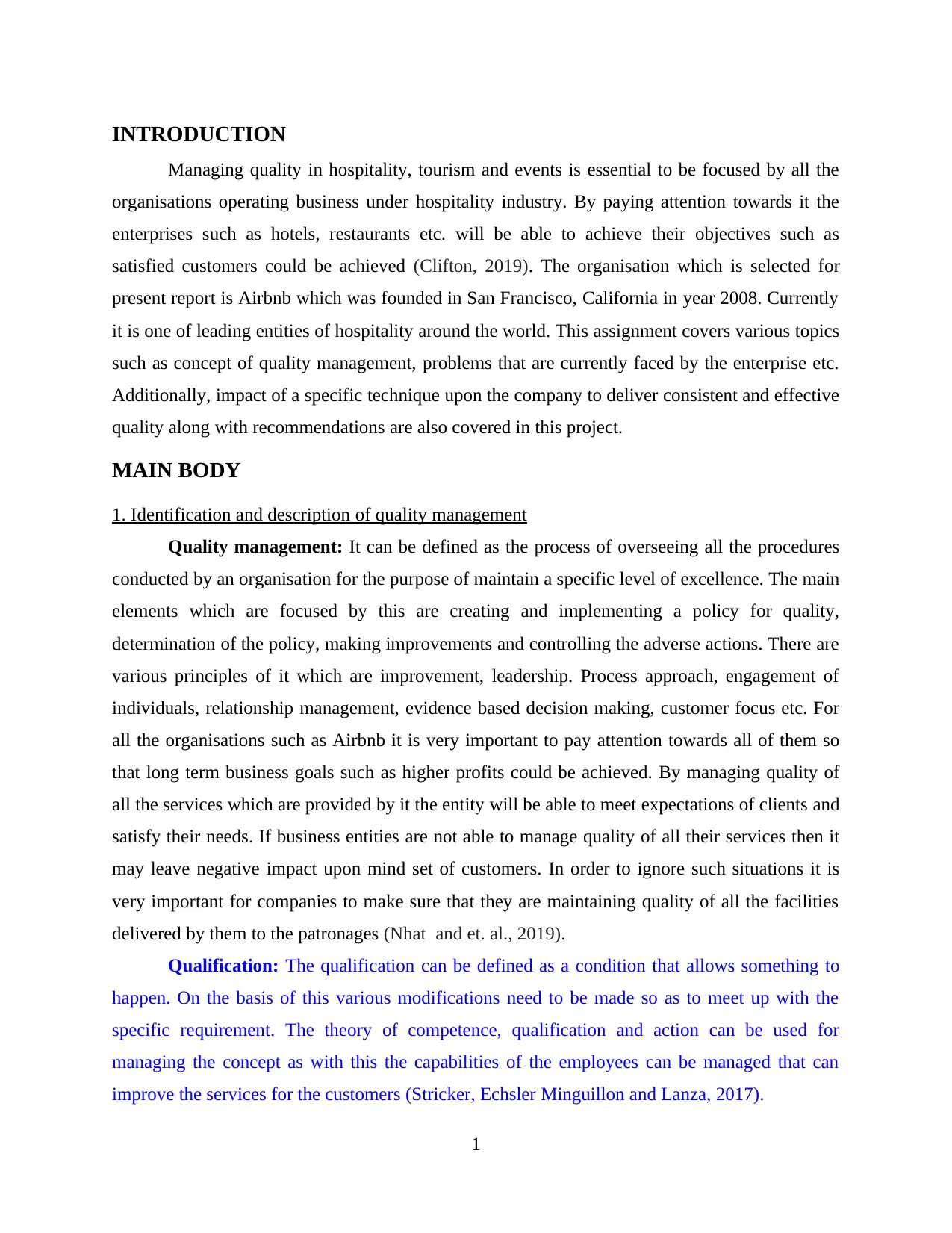
INTRODUCTION
Managing quality in hospitality, tourism and events is essential to be focused by all the
organisations operating business under hospitality industry. By paying attention towards it the
enterprises such as hotels, restaurants etc. will be able to achieve their objectives such as
satisfied customers could be achieved (Clifton, 2019). The organisation which is selected for
present report is Airbnb which was founded in San Francisco, California in year 2008. Currently
it is one of leading entities of hospitality around the world. This assignment covers various topics
such as concept of quality management, problems that are currently faced by the enterprise etc.
Additionally, impact of a specific technique upon the company to deliver consistent and effective
quality along with recommendations are also covered in this project.
MAIN BODY
1. Identification and description of quality management
Quality management: It can be defined as the process of overseeing all the procedures
conducted by an organisation for the purpose of maintain a specific level of excellence. The main
elements which are focused by this are creating and implementing a policy for quality,
determination of the policy, making improvements and controlling the adverse actions. There are
various principles of it which are improvement, leadership. Process approach, engagement of
individuals, relationship management, evidence based decision making, customer focus etc. For
all the organisations such as Airbnb it is very important to pay attention towards all of them so
that long term business goals such as higher profits could be achieved. By managing quality of
all the services which are provided by it the entity will be able to meet expectations of clients and
satisfy their needs. If business entities are not able to manage quality of all their services then it
may leave negative impact upon mind set of customers. In order to ignore such situations it is
very important for companies to make sure that they are maintaining quality of all the facilities
delivered by them to the patronages (Nhat and et. al., 2019).
Qualification: The qualification can be defined as a condition that allows something to
happen. On the basis of this various modifications need to be made so as to meet up with the
specific requirement. The theory of competence, qualification and action can be used for
managing the concept as with this the capabilities of the employees can be managed that can
improve the services for the customers (Stricker, Echsler Minguillon and Lanza, 2017).
1
Managing quality in hospitality, tourism and events is essential to be focused by all the
organisations operating business under hospitality industry. By paying attention towards it the
enterprises such as hotels, restaurants etc. will be able to achieve their objectives such as
satisfied customers could be achieved (Clifton, 2019). The organisation which is selected for
present report is Airbnb which was founded in San Francisco, California in year 2008. Currently
it is one of leading entities of hospitality around the world. This assignment covers various topics
such as concept of quality management, problems that are currently faced by the enterprise etc.
Additionally, impact of a specific technique upon the company to deliver consistent and effective
quality along with recommendations are also covered in this project.
MAIN BODY
1. Identification and description of quality management
Quality management: It can be defined as the process of overseeing all the procedures
conducted by an organisation for the purpose of maintain a specific level of excellence. The main
elements which are focused by this are creating and implementing a policy for quality,
determination of the policy, making improvements and controlling the adverse actions. There are
various principles of it which are improvement, leadership. Process approach, engagement of
individuals, relationship management, evidence based decision making, customer focus etc. For
all the organisations such as Airbnb it is very important to pay attention towards all of them so
that long term business goals such as higher profits could be achieved. By managing quality of
all the services which are provided by it the entity will be able to meet expectations of clients and
satisfy their needs. If business entities are not able to manage quality of all their services then it
may leave negative impact upon mind set of customers. In order to ignore such situations it is
very important for companies to make sure that they are maintaining quality of all the facilities
delivered by them to the patronages (Nhat and et. al., 2019).
Qualification: The qualification can be defined as a condition that allows something to
happen. On the basis of this various modifications need to be made so as to meet up with the
specific requirement. The theory of competence, qualification and action can be used for
managing the concept as with this the capabilities of the employees can be managed that can
improve the services for the customers (Stricker, Echsler Minguillon and Lanza, 2017).
1
Paraphrase This Document
Need a fresh take? Get an instant paraphrase of this document with our AI Paraphraser
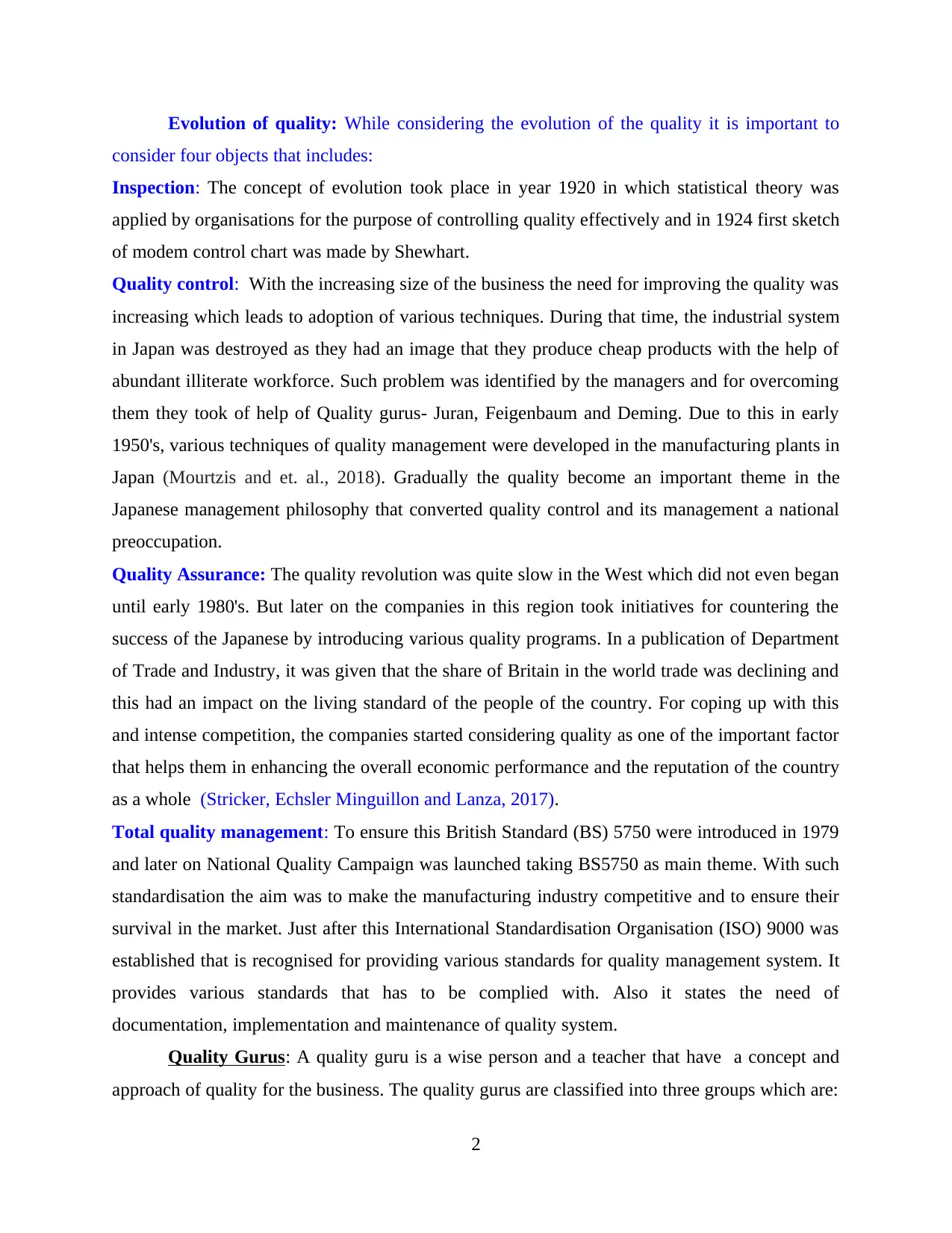
Evolution of quality: While considering the evolution of the quality it is important to
consider four objects that includes:
Inspection: The concept of evolution took place in year 1920 in which statistical theory was
applied by organisations for the purpose of controlling quality effectively and in 1924 first sketch
of modem control chart was made by Shewhart.
Quality control: With the increasing size of the business the need for improving the quality was
increasing which leads to adoption of various techniques. During that time, the industrial system
in Japan was destroyed as they had an image that they produce cheap products with the help of
abundant illiterate workforce. Such problem was identified by the managers and for overcoming
them they took of help of Quality gurus- Juran, Feigenbaum and Deming. Due to this in early
1950's, various techniques of quality management were developed in the manufacturing plants in
Japan (Mourtzis and et. al., 2018). Gradually the quality become an important theme in the
Japanese management philosophy that converted quality control and its management a national
preoccupation.
Quality Assurance: The quality revolution was quite slow in the West which did not even began
until early 1980's. But later on the companies in this region took initiatives for countering the
success of the Japanese by introducing various quality programs. In a publication of Department
of Trade and Industry, it was given that the share of Britain in the world trade was declining and
this had an impact on the living standard of the people of the country. For coping up with this
and intense competition, the companies started considering quality as one of the important factor
that helps them in enhancing the overall economic performance and the reputation of the country
as a whole (Stricker, Echsler Minguillon and Lanza, 2017).
Total quality management: To ensure this British Standard (BS) 5750 were introduced in 1979
and later on National Quality Campaign was launched taking BS5750 as main theme. With such
standardisation the aim was to make the manufacturing industry competitive and to ensure their
survival in the market. Just after this International Standardisation Organisation (ISO) 9000 was
established that is recognised for providing various standards for quality management system. It
provides various standards that has to be complied with. Also it states the need of
documentation, implementation and maintenance of quality system.
Quality Gurus: A quality guru is a wise person and a teacher that have a concept and
approach of quality for the business. The quality gurus are classified into three groups which are:
2
consider four objects that includes:
Inspection: The concept of evolution took place in year 1920 in which statistical theory was
applied by organisations for the purpose of controlling quality effectively and in 1924 first sketch
of modem control chart was made by Shewhart.
Quality control: With the increasing size of the business the need for improving the quality was
increasing which leads to adoption of various techniques. During that time, the industrial system
in Japan was destroyed as they had an image that they produce cheap products with the help of
abundant illiterate workforce. Such problem was identified by the managers and for overcoming
them they took of help of Quality gurus- Juran, Feigenbaum and Deming. Due to this in early
1950's, various techniques of quality management were developed in the manufacturing plants in
Japan (Mourtzis and et. al., 2018). Gradually the quality become an important theme in the
Japanese management philosophy that converted quality control and its management a national
preoccupation.
Quality Assurance: The quality revolution was quite slow in the West which did not even began
until early 1980's. But later on the companies in this region took initiatives for countering the
success of the Japanese by introducing various quality programs. In a publication of Department
of Trade and Industry, it was given that the share of Britain in the world trade was declining and
this had an impact on the living standard of the people of the country. For coping up with this
and intense competition, the companies started considering quality as one of the important factor
that helps them in enhancing the overall economic performance and the reputation of the country
as a whole (Stricker, Echsler Minguillon and Lanza, 2017).
Total quality management: To ensure this British Standard (BS) 5750 were introduced in 1979
and later on National Quality Campaign was launched taking BS5750 as main theme. With such
standardisation the aim was to make the manufacturing industry competitive and to ensure their
survival in the market. Just after this International Standardisation Organisation (ISO) 9000 was
established that is recognised for providing various standards for quality management system. It
provides various standards that has to be complied with. Also it states the need of
documentation, implementation and maintenance of quality system.
Quality Gurus: A quality guru is a wise person and a teacher that have a concept and
approach of quality for the business. The quality gurus are classified into three groups which are:
2
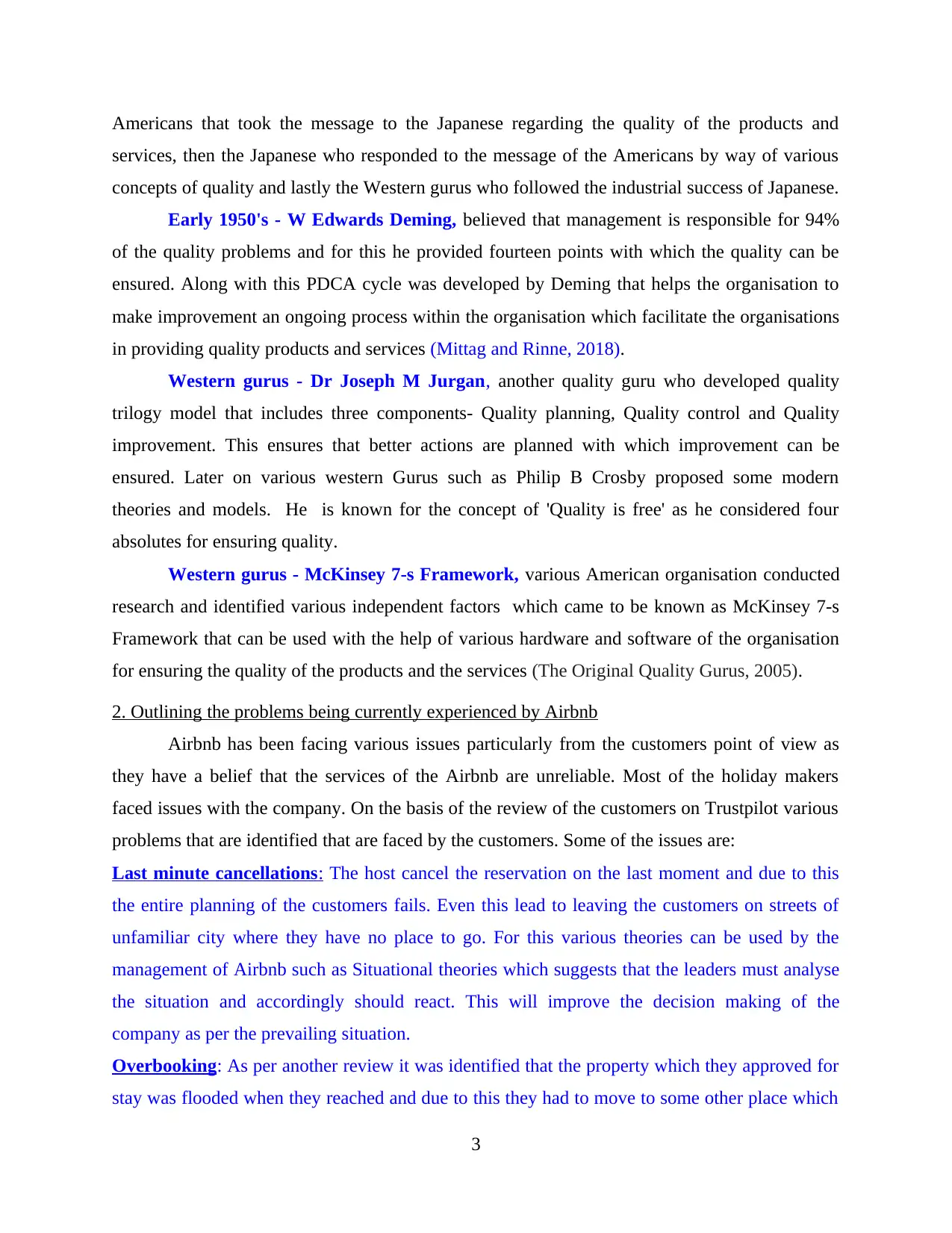
Americans that took the message to the Japanese regarding the quality of the products and
services, then the Japanese who responded to the message of the Americans by way of various
concepts of quality and lastly the Western gurus who followed the industrial success of Japanese.
Early 1950's - W Edwards Deming, believed that management is responsible for 94%
of the quality problems and for this he provided fourteen points with which the quality can be
ensured. Along with this PDCA cycle was developed by Deming that helps the organisation to
make improvement an ongoing process within the organisation which facilitate the organisations
in providing quality products and services (Mittag and Rinne, 2018).
Western gurus - Dr Joseph M Jurgan, another quality guru who developed quality
trilogy model that includes three components- Quality planning, Quality control and Quality
improvement. This ensures that better actions are planned with which improvement can be
ensured. Later on various western Gurus such as Philip B Crosby proposed some modern
theories and models. He is known for the concept of 'Quality is free' as he considered four
absolutes for ensuring quality.
Western gurus - McKinsey 7-s Framework, various American organisation conducted
research and identified various independent factors which came to be known as McKinsey 7-s
Framework that can be used with the help of various hardware and software of the organisation
for ensuring the quality of the products and the services (The Original Quality Gurus, 2005).
2. Outlining the problems being currently experienced by Airbnb
Airbnb has been facing various issues particularly from the customers point of view as
they have a belief that the services of the Airbnb are unreliable. Most of the holiday makers
faced issues with the company. On the basis of the review of the customers on Trustpilot various
problems that are identified that are faced by the customers. Some of the issues are:
Last minute cancellations: The host cancel the reservation on the last moment and due to this
the entire planning of the customers fails. Even this lead to leaving the customers on streets of
unfamiliar city where they have no place to go. For this various theories can be used by the
management of Airbnb such as Situational theories which suggests that the leaders must analyse
the situation and accordingly should react. This will improve the decision making of the
company as per the prevailing situation.
Overbooking: As per another review it was identified that the property which they approved for
stay was flooded when they reached and due to this they had to move to some other place which
3
services, then the Japanese who responded to the message of the Americans by way of various
concepts of quality and lastly the Western gurus who followed the industrial success of Japanese.
Early 1950's - W Edwards Deming, believed that management is responsible for 94%
of the quality problems and for this he provided fourteen points with which the quality can be
ensured. Along with this PDCA cycle was developed by Deming that helps the organisation to
make improvement an ongoing process within the organisation which facilitate the organisations
in providing quality products and services (Mittag and Rinne, 2018).
Western gurus - Dr Joseph M Jurgan, another quality guru who developed quality
trilogy model that includes three components- Quality planning, Quality control and Quality
improvement. This ensures that better actions are planned with which improvement can be
ensured. Later on various western Gurus such as Philip B Crosby proposed some modern
theories and models. He is known for the concept of 'Quality is free' as he considered four
absolutes for ensuring quality.
Western gurus - McKinsey 7-s Framework, various American organisation conducted
research and identified various independent factors which came to be known as McKinsey 7-s
Framework that can be used with the help of various hardware and software of the organisation
for ensuring the quality of the products and the services (The Original Quality Gurus, 2005).
2. Outlining the problems being currently experienced by Airbnb
Airbnb has been facing various issues particularly from the customers point of view as
they have a belief that the services of the Airbnb are unreliable. Most of the holiday makers
faced issues with the company. On the basis of the review of the customers on Trustpilot various
problems that are identified that are faced by the customers. Some of the issues are:
Last minute cancellations: The host cancel the reservation on the last moment and due to this
the entire planning of the customers fails. Even this lead to leaving the customers on streets of
unfamiliar city where they have no place to go. For this various theories can be used by the
management of Airbnb such as Situational theories which suggests that the leaders must analyse
the situation and accordingly should react. This will improve the decision making of the
company as per the prevailing situation.
Overbooking: As per another review it was identified that the property which they approved for
stay was flooded when they reached and due to this they had to move to some other place which
3
⊘ This is a preview!⊘
Do you want full access?
Subscribe today to unlock all pages.

Trusted by 1+ million students worldwide
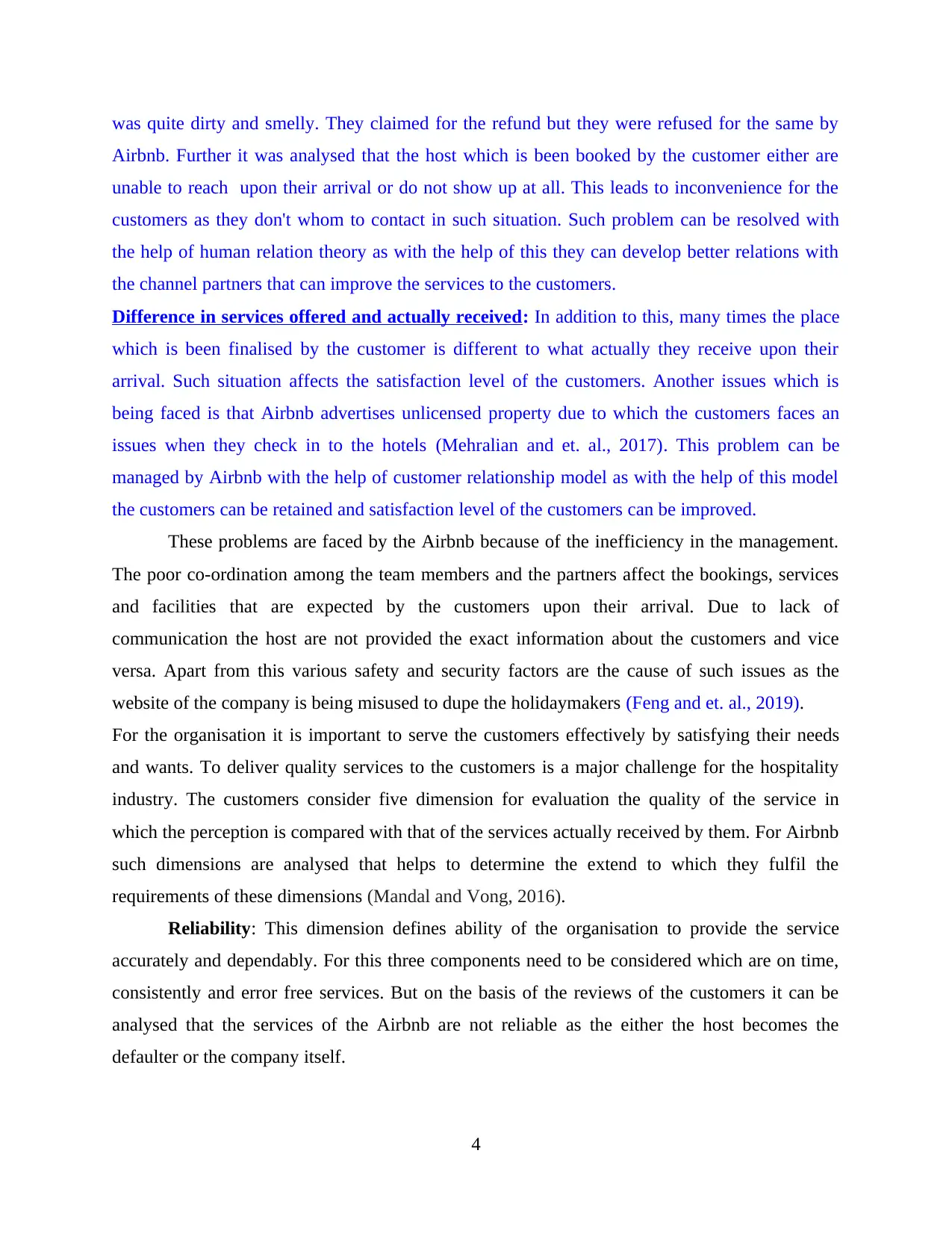
was quite dirty and smelly. They claimed for the refund but they were refused for the same by
Airbnb. Further it was analysed that the host which is been booked by the customer either are
unable to reach upon their arrival or do not show up at all. This leads to inconvenience for the
customers as they don't whom to contact in such situation. Such problem can be resolved with
the help of human relation theory as with the help of this they can develop better relations with
the channel partners that can improve the services to the customers.
Difference in services offered and actually received: In addition to this, many times the place
which is been finalised by the customer is different to what actually they receive upon their
arrival. Such situation affects the satisfaction level of the customers. Another issues which is
being faced is that Airbnb advertises unlicensed property due to which the customers faces an
issues when they check in to the hotels (Mehralian and et. al., 2017). This problem can be
managed by Airbnb with the help of customer relationship model as with the help of this model
the customers can be retained and satisfaction level of the customers can be improved.
These problems are faced by the Airbnb because of the inefficiency in the management.
The poor co-ordination among the team members and the partners affect the bookings, services
and facilities that are expected by the customers upon their arrival. Due to lack of
communication the host are not provided the exact information about the customers and vice
versa. Apart from this various safety and security factors are the cause of such issues as the
website of the company is being misused to dupe the holidaymakers (Feng and et. al., 2019).
For the organisation it is important to serve the customers effectively by satisfying their needs
and wants. To deliver quality services to the customers is a major challenge for the hospitality
industry. The customers consider five dimension for evaluation the quality of the service in
which the perception is compared with that of the services actually received by them. For Airbnb
such dimensions are analysed that helps to determine the extend to which they fulfil the
requirements of these dimensions (Mandal and Vong, 2016).
Reliability: This dimension defines ability of the organisation to provide the service
accurately and dependably. For this three components need to be considered which are on time,
consistently and error free services. But on the basis of the reviews of the customers it can be
analysed that the services of the Airbnb are not reliable as the either the host becomes the
defaulter or the company itself.
4
Airbnb. Further it was analysed that the host which is been booked by the customer either are
unable to reach upon their arrival or do not show up at all. This leads to inconvenience for the
customers as they don't whom to contact in such situation. Such problem can be resolved with
the help of human relation theory as with the help of this they can develop better relations with
the channel partners that can improve the services to the customers.
Difference in services offered and actually received: In addition to this, many times the place
which is been finalised by the customer is different to what actually they receive upon their
arrival. Such situation affects the satisfaction level of the customers. Another issues which is
being faced is that Airbnb advertises unlicensed property due to which the customers faces an
issues when they check in to the hotels (Mehralian and et. al., 2017). This problem can be
managed by Airbnb with the help of customer relationship model as with the help of this model
the customers can be retained and satisfaction level of the customers can be improved.
These problems are faced by the Airbnb because of the inefficiency in the management.
The poor co-ordination among the team members and the partners affect the bookings, services
and facilities that are expected by the customers upon their arrival. Due to lack of
communication the host are not provided the exact information about the customers and vice
versa. Apart from this various safety and security factors are the cause of such issues as the
website of the company is being misused to dupe the holidaymakers (Feng and et. al., 2019).
For the organisation it is important to serve the customers effectively by satisfying their needs
and wants. To deliver quality services to the customers is a major challenge for the hospitality
industry. The customers consider five dimension for evaluation the quality of the service in
which the perception is compared with that of the services actually received by them. For Airbnb
such dimensions are analysed that helps to determine the extend to which they fulfil the
requirements of these dimensions (Mandal and Vong, 2016).
Reliability: This dimension defines ability of the organisation to provide the service
accurately and dependably. For this three components need to be considered which are on time,
consistently and error free services. But on the basis of the reviews of the customers it can be
analysed that the services of the Airbnb are not reliable as the either the host becomes the
defaulter or the company itself.
4
Paraphrase This Document
Need a fresh take? Get an instant paraphrase of this document with our AI Paraphraser
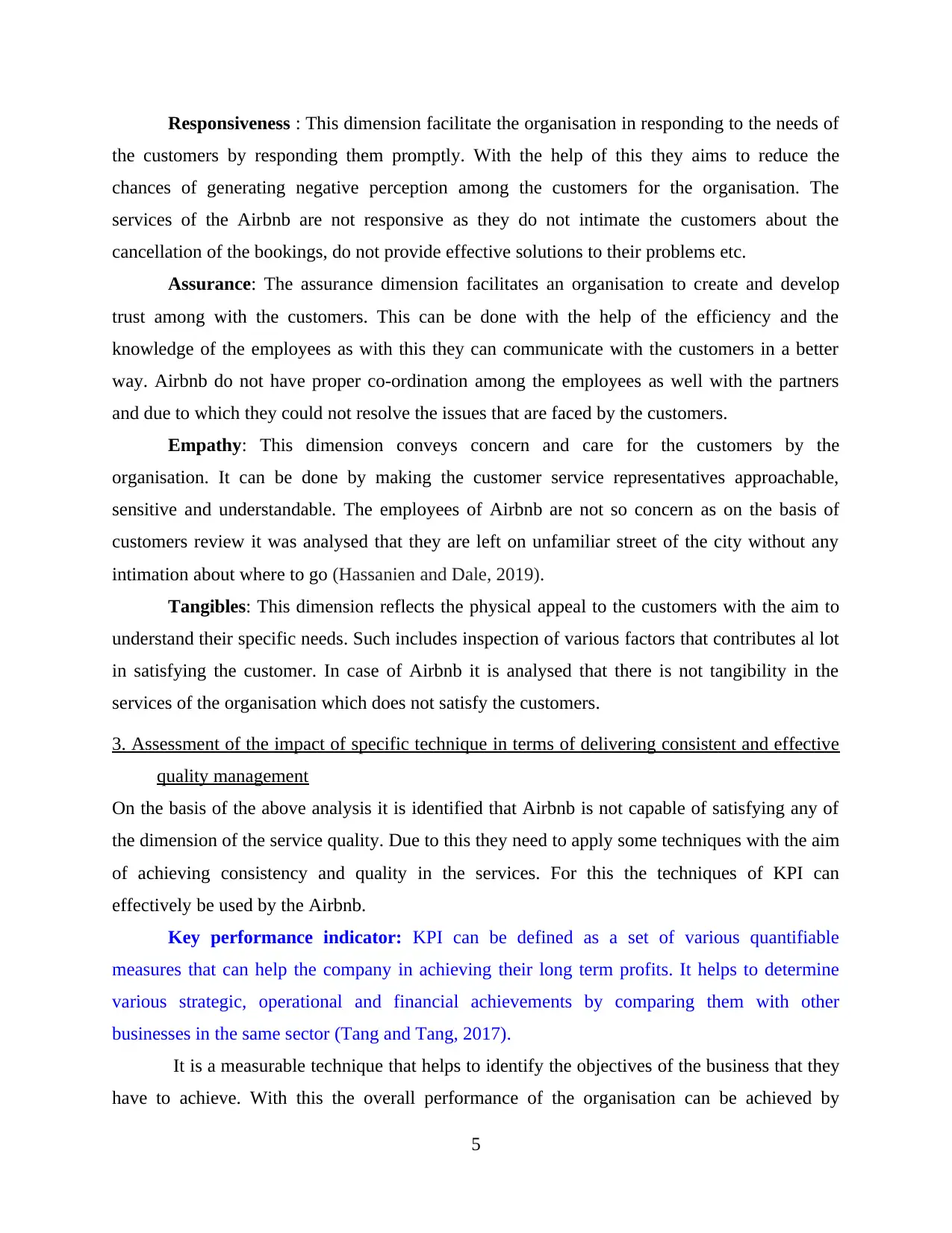
Responsiveness : This dimension facilitate the organisation in responding to the needs of
the customers by responding them promptly. With the help of this they aims to reduce the
chances of generating negative perception among the customers for the organisation. The
services of the Airbnb are not responsive as they do not intimate the customers about the
cancellation of the bookings, do not provide effective solutions to their problems etc.
Assurance: The assurance dimension facilitates an organisation to create and develop
trust among with the customers. This can be done with the help of the efficiency and the
knowledge of the employees as with this they can communicate with the customers in a better
way. Airbnb do not have proper co-ordination among the employees as well with the partners
and due to which they could not resolve the issues that are faced by the customers.
Empathy: This dimension conveys concern and care for the customers by the
organisation. It can be done by making the customer service representatives approachable,
sensitive and understandable. The employees of Airbnb are not so concern as on the basis of
customers review it was analysed that they are left on unfamiliar street of the city without any
intimation about where to go (Hassanien and Dale, 2019).
Tangibles: This dimension reflects the physical appeal to the customers with the aim to
understand their specific needs. Such includes inspection of various factors that contributes al lot
in satisfying the customer. In case of Airbnb it is analysed that there is not tangibility in the
services of the organisation which does not satisfy the customers.
3. Assessment of the impact of specific technique in terms of delivering consistent and effective
quality management
On the basis of the above analysis it is identified that Airbnb is not capable of satisfying any of
the dimension of the service quality. Due to this they need to apply some techniques with the aim
of achieving consistency and quality in the services. For this the techniques of KPI can
effectively be used by the Airbnb.
Key performance indicator: KPI can be defined as a set of various quantifiable
measures that can help the company in achieving their long term profits. It helps to determine
various strategic, operational and financial achievements by comparing them with other
businesses in the same sector (Tang and Tang, 2017).
It is a measurable technique that helps to identify the objectives of the business that they
have to achieve. With this the overall performance of the organisation can be achieved by
5
the customers by responding them promptly. With the help of this they aims to reduce the
chances of generating negative perception among the customers for the organisation. The
services of the Airbnb are not responsive as they do not intimate the customers about the
cancellation of the bookings, do not provide effective solutions to their problems etc.
Assurance: The assurance dimension facilitates an organisation to create and develop
trust among with the customers. This can be done with the help of the efficiency and the
knowledge of the employees as with this they can communicate with the customers in a better
way. Airbnb do not have proper co-ordination among the employees as well with the partners
and due to which they could not resolve the issues that are faced by the customers.
Empathy: This dimension conveys concern and care for the customers by the
organisation. It can be done by making the customer service representatives approachable,
sensitive and understandable. The employees of Airbnb are not so concern as on the basis of
customers review it was analysed that they are left on unfamiliar street of the city without any
intimation about where to go (Hassanien and Dale, 2019).
Tangibles: This dimension reflects the physical appeal to the customers with the aim to
understand their specific needs. Such includes inspection of various factors that contributes al lot
in satisfying the customer. In case of Airbnb it is analysed that there is not tangibility in the
services of the organisation which does not satisfy the customers.
3. Assessment of the impact of specific technique in terms of delivering consistent and effective
quality management
On the basis of the above analysis it is identified that Airbnb is not capable of satisfying any of
the dimension of the service quality. Due to this they need to apply some techniques with the aim
of achieving consistency and quality in the services. For this the techniques of KPI can
effectively be used by the Airbnb.
Key performance indicator: KPI can be defined as a set of various quantifiable
measures that can help the company in achieving their long term profits. It helps to determine
various strategic, operational and financial achievements by comparing them with other
businesses in the same sector (Tang and Tang, 2017).
It is a measurable technique that helps to identify the objectives of the business that they
have to achieve. With this the overall performance of the organisation can be achieved by
5
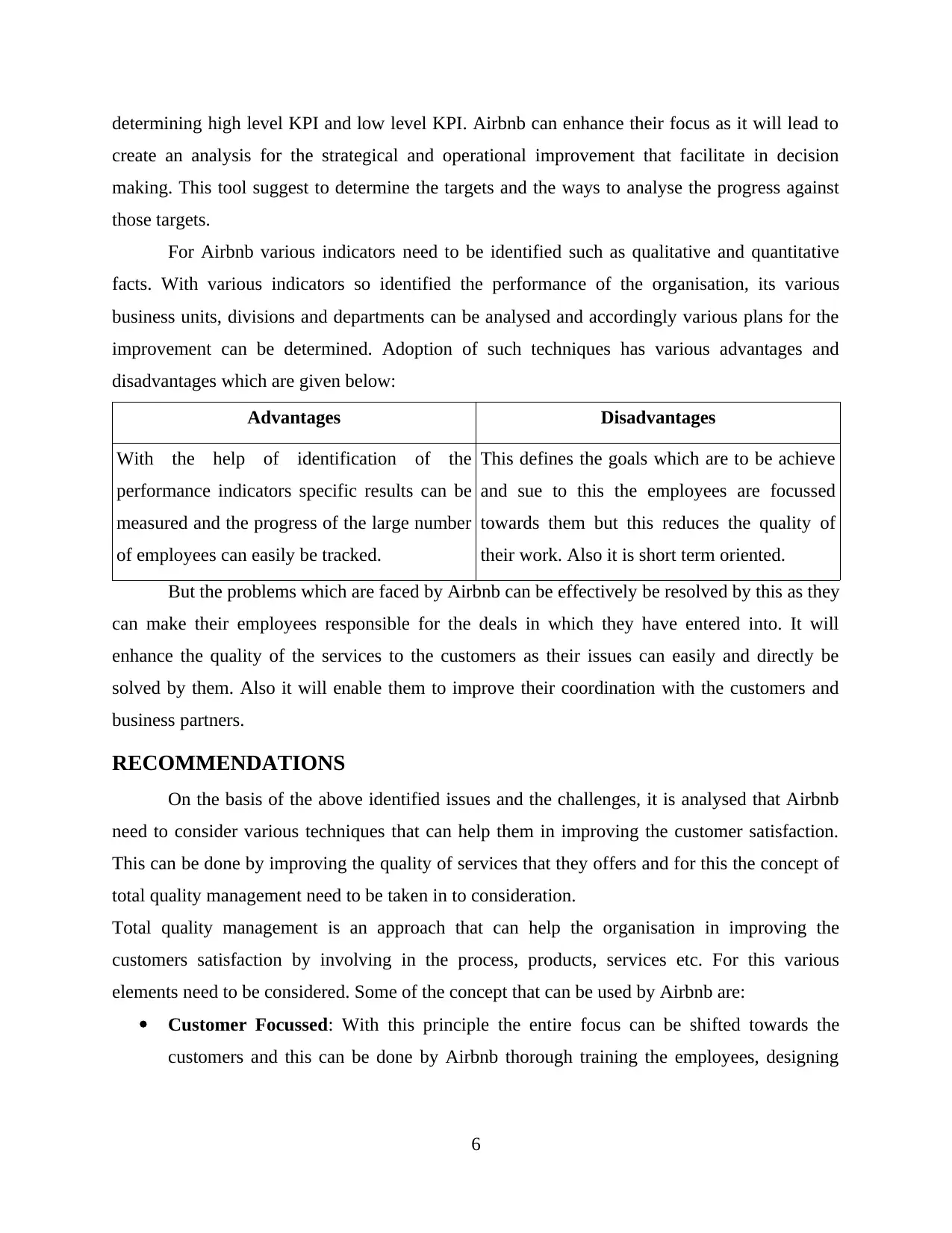
determining high level KPI and low level KPI. Airbnb can enhance their focus as it will lead to
create an analysis for the strategical and operational improvement that facilitate in decision
making. This tool suggest to determine the targets and the ways to analyse the progress against
those targets.
For Airbnb various indicators need to be identified such as qualitative and quantitative
facts. With various indicators so identified the performance of the organisation, its various
business units, divisions and departments can be analysed and accordingly various plans for the
improvement can be determined. Adoption of such techniques has various advantages and
disadvantages which are given below:
Advantages Disadvantages
With the help of identification of the
performance indicators specific results can be
measured and the progress of the large number
of employees can easily be tracked.
This defines the goals which are to be achieve
and sue to this the employees are focussed
towards them but this reduces the quality of
their work. Also it is short term oriented.
But the problems which are faced by Airbnb can be effectively be resolved by this as they
can make their employees responsible for the deals in which they have entered into. It will
enhance the quality of the services to the customers as their issues can easily and directly be
solved by them. Also it will enable them to improve their coordination with the customers and
business partners.
RECOMMENDATIONS
On the basis of the above identified issues and the challenges, it is analysed that Airbnb
need to consider various techniques that can help them in improving the customer satisfaction.
This can be done by improving the quality of services that they offers and for this the concept of
total quality management need to be taken in to consideration.
Total quality management is an approach that can help the organisation in improving the
customers satisfaction by involving in the process, products, services etc. For this various
elements need to be considered. Some of the concept that can be used by Airbnb are:
Customer Focussed: With this principle the entire focus can be shifted towards the
customers and this can be done by Airbnb thorough training the employees, designing
6
create an analysis for the strategical and operational improvement that facilitate in decision
making. This tool suggest to determine the targets and the ways to analyse the progress against
those targets.
For Airbnb various indicators need to be identified such as qualitative and quantitative
facts. With various indicators so identified the performance of the organisation, its various
business units, divisions and departments can be analysed and accordingly various plans for the
improvement can be determined. Adoption of such techniques has various advantages and
disadvantages which are given below:
Advantages Disadvantages
With the help of identification of the
performance indicators specific results can be
measured and the progress of the large number
of employees can easily be tracked.
This defines the goals which are to be achieve
and sue to this the employees are focussed
towards them but this reduces the quality of
their work. Also it is short term oriented.
But the problems which are faced by Airbnb can be effectively be resolved by this as they
can make their employees responsible for the deals in which they have entered into. It will
enhance the quality of the services to the customers as their issues can easily and directly be
solved by them. Also it will enable them to improve their coordination with the customers and
business partners.
RECOMMENDATIONS
On the basis of the above identified issues and the challenges, it is analysed that Airbnb
need to consider various techniques that can help them in improving the customer satisfaction.
This can be done by improving the quality of services that they offers and for this the concept of
total quality management need to be taken in to consideration.
Total quality management is an approach that can help the organisation in improving the
customers satisfaction by involving in the process, products, services etc. For this various
elements need to be considered. Some of the concept that can be used by Airbnb are:
Customer Focussed: With this principle the entire focus can be shifted towards the
customers and this can be done by Airbnb thorough training the employees, designing
6
⊘ This is a preview!⊘
Do you want full access?
Subscribe today to unlock all pages.

Trusted by 1+ million students worldwide
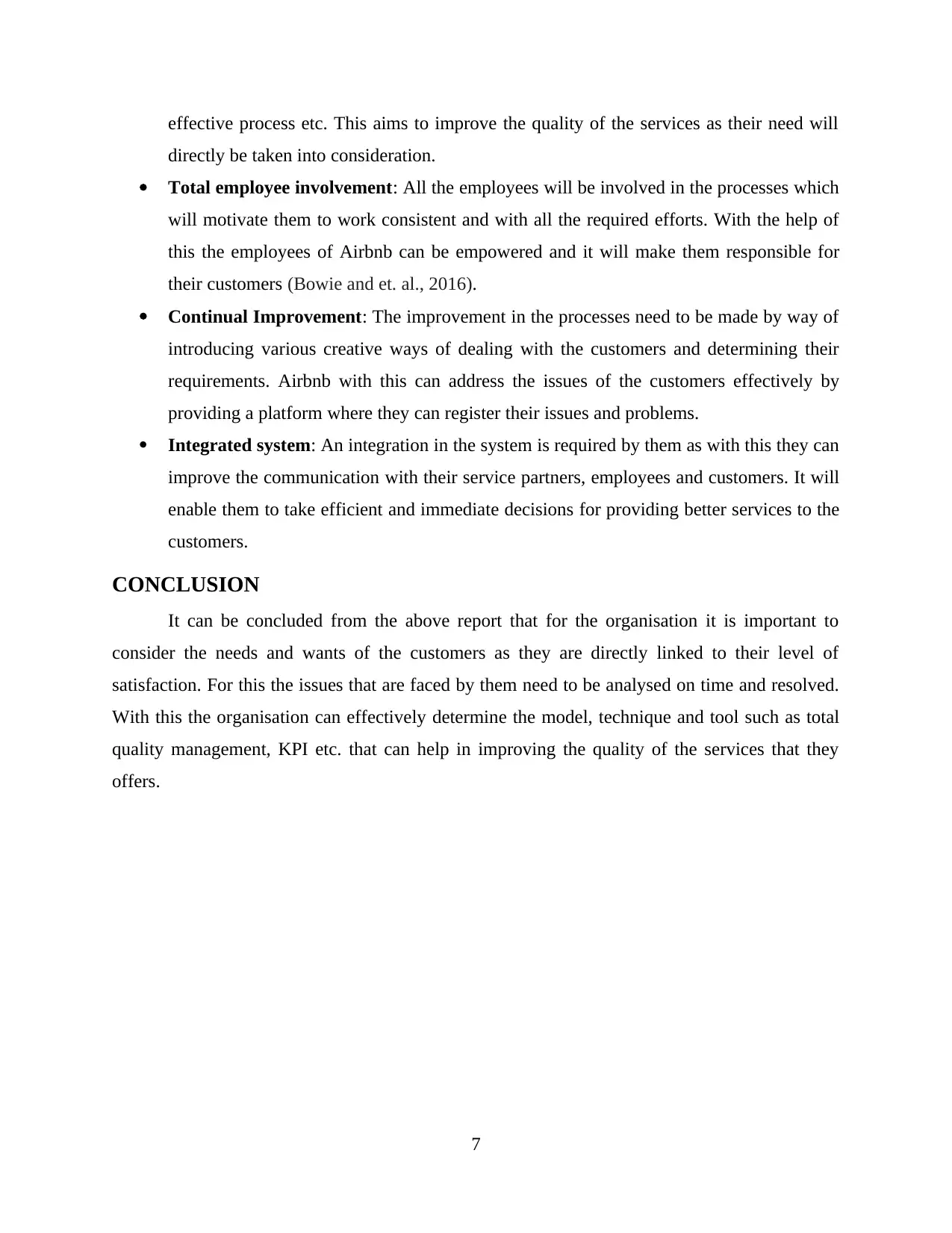
effective process etc. This aims to improve the quality of the services as their need will
directly be taken into consideration.
Total employee involvement: All the employees will be involved in the processes which
will motivate them to work consistent and with all the required efforts. With the help of
this the employees of Airbnb can be empowered and it will make them responsible for
their customers (Bowie and et. al., 2016).
Continual Improvement: The improvement in the processes need to be made by way of
introducing various creative ways of dealing with the customers and determining their
requirements. Airbnb with this can address the issues of the customers effectively by
providing a platform where they can register their issues and problems.
Integrated system: An integration in the system is required by them as with this they can
improve the communication with their service partners, employees and customers. It will
enable them to take efficient and immediate decisions for providing better services to the
customers.
CONCLUSION
It can be concluded from the above report that for the organisation it is important to
consider the needs and wants of the customers as they are directly linked to their level of
satisfaction. For this the issues that are faced by them need to be analysed on time and resolved.
With this the organisation can effectively determine the model, technique and tool such as total
quality management, KPI etc. that can help in improving the quality of the services that they
offers.
7
directly be taken into consideration.
Total employee involvement: All the employees will be involved in the processes which
will motivate them to work consistent and with all the required efforts. With the help of
this the employees of Airbnb can be empowered and it will make them responsible for
their customers (Bowie and et. al., 2016).
Continual Improvement: The improvement in the processes need to be made by way of
introducing various creative ways of dealing with the customers and determining their
requirements. Airbnb with this can address the issues of the customers effectively by
providing a platform where they can register their issues and problems.
Integrated system: An integration in the system is required by them as with this they can
improve the communication with their service partners, employees and customers. It will
enable them to take efficient and immediate decisions for providing better services to the
customers.
CONCLUSION
It can be concluded from the above report that for the organisation it is important to
consider the needs and wants of the customers as they are directly linked to their level of
satisfaction. For this the issues that are faced by them need to be analysed on time and resolved.
With this the organisation can effectively determine the model, technique and tool such as total
quality management, KPI etc. that can help in improving the quality of the services that they
offers.
7
Paraphrase This Document
Need a fresh take? Get an instant paraphrase of this document with our AI Paraphraser
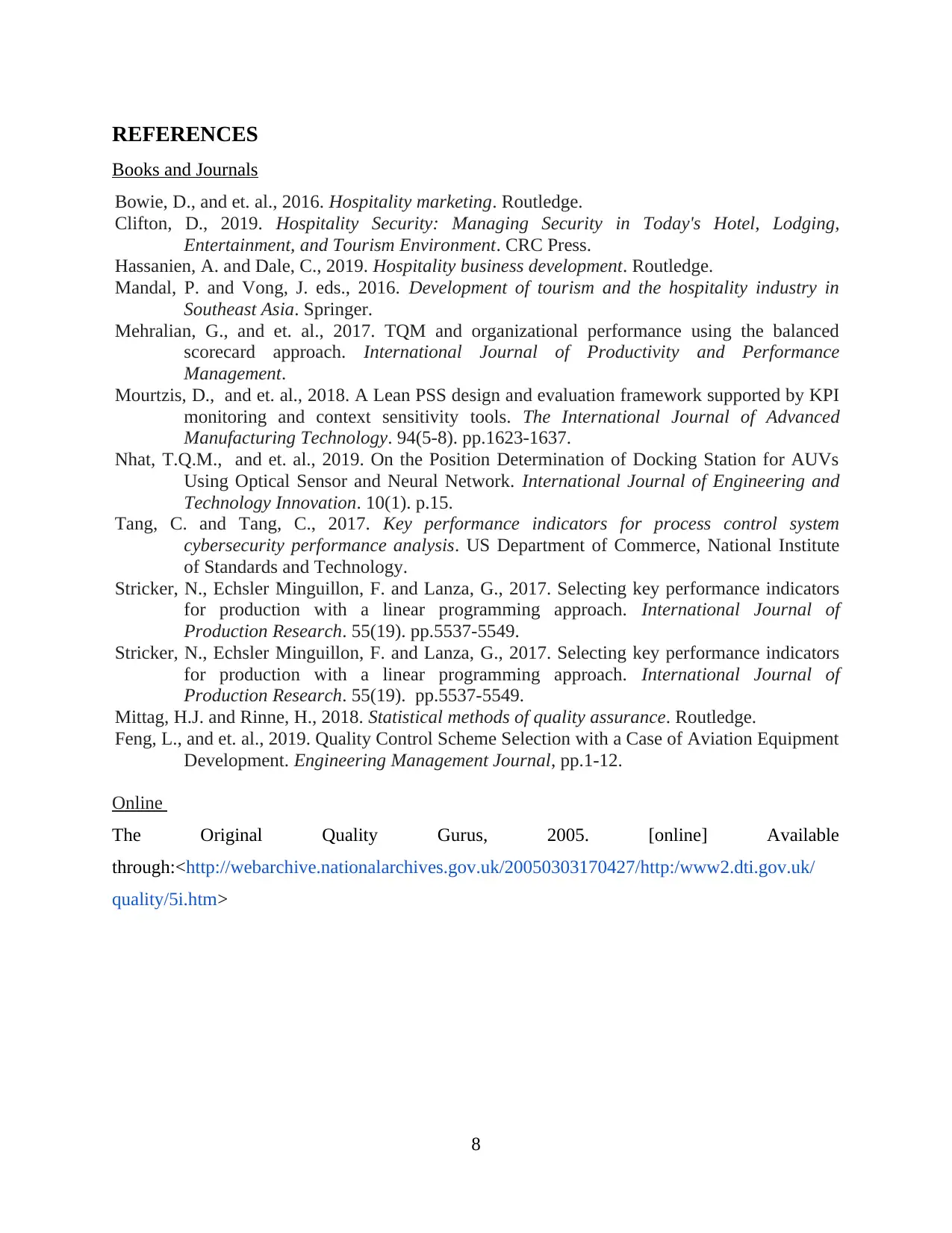
REFERENCES
Books and Journals
Bowie, D., and et. al., 2016. Hospitality marketing. Routledge.
Clifton, D., 2019. Hospitality Security: Managing Security in Today's Hotel, Lodging,
Entertainment, and Tourism Environment. CRC Press.
Hassanien, A. and Dale, C., 2019. Hospitality business development. Routledge.
Mandal, P. and Vong, J. eds., 2016. Development of tourism and the hospitality industry in
Southeast Asia. Springer.
Mehralian, G., and et. al., 2017. TQM and organizational performance using the balanced
scorecard approach. International Journal of Productivity and Performance
Management.
Mourtzis, D., and et. al., 2018. A Lean PSS design and evaluation framework supported by KPI
monitoring and context sensitivity tools. The International Journal of Advanced
Manufacturing Technology. 94(5-8). pp.1623-1637.
Nhat, T.Q.M., and et. al., 2019. On the Position Determination of Docking Station for AUVs
Using Optical Sensor and Neural Network. International Journal of Engineering and
Technology Innovation. 10(1). p.15.
Tang, C. and Tang, C., 2017. Key performance indicators for process control system
cybersecurity performance analysis. US Department of Commerce, National Institute
of Standards and Technology.
Stricker, N., Echsler Minguillon, F. and Lanza, G., 2017. Selecting key performance indicators
for production with a linear programming approach. International Journal of
Production Research. 55(19). pp.5537-5549.
Stricker, N., Echsler Minguillon, F. and Lanza, G., 2017. Selecting key performance indicators
for production with a linear programming approach. International Journal of
Production Research. 55(19). pp.5537-5549.
Mittag, H.J. and Rinne, H., 2018. Statistical methods of quality assurance. Routledge.
Feng, L., and et. al., 2019. Quality Control Scheme Selection with a Case of Aviation Equipment
Development. Engineering Management Journal, pp.1-12.
Online
The Original Quality Gurus, 2005. [online] Available
through:<http://webarchive.nationalarchives.gov.uk/20050303170427/http:/www2.dti.gov.uk/
quality/5i.htm>
8
Books and Journals
Bowie, D., and et. al., 2016. Hospitality marketing. Routledge.
Clifton, D., 2019. Hospitality Security: Managing Security in Today's Hotel, Lodging,
Entertainment, and Tourism Environment. CRC Press.
Hassanien, A. and Dale, C., 2019. Hospitality business development. Routledge.
Mandal, P. and Vong, J. eds., 2016. Development of tourism and the hospitality industry in
Southeast Asia. Springer.
Mehralian, G., and et. al., 2017. TQM and organizational performance using the balanced
scorecard approach. International Journal of Productivity and Performance
Management.
Mourtzis, D., and et. al., 2018. A Lean PSS design and evaluation framework supported by KPI
monitoring and context sensitivity tools. The International Journal of Advanced
Manufacturing Technology. 94(5-8). pp.1623-1637.
Nhat, T.Q.M., and et. al., 2019. On the Position Determination of Docking Station for AUVs
Using Optical Sensor and Neural Network. International Journal of Engineering and
Technology Innovation. 10(1). p.15.
Tang, C. and Tang, C., 2017. Key performance indicators for process control system
cybersecurity performance analysis. US Department of Commerce, National Institute
of Standards and Technology.
Stricker, N., Echsler Minguillon, F. and Lanza, G., 2017. Selecting key performance indicators
for production with a linear programming approach. International Journal of
Production Research. 55(19). pp.5537-5549.
Stricker, N., Echsler Minguillon, F. and Lanza, G., 2017. Selecting key performance indicators
for production with a linear programming approach. International Journal of
Production Research. 55(19). pp.5537-5549.
Mittag, H.J. and Rinne, H., 2018. Statistical methods of quality assurance. Routledge.
Feng, L., and et. al., 2019. Quality Control Scheme Selection with a Case of Aviation Equipment
Development. Engineering Management Journal, pp.1-12.
Online
The Original Quality Gurus, 2005. [online] Available
through:<http://webarchive.nationalarchives.gov.uk/20050303170427/http:/www2.dti.gov.uk/
quality/5i.htm>
8
1 out of 11
Related Documents
Your All-in-One AI-Powered Toolkit for Academic Success.
+13062052269
info@desklib.com
Available 24*7 on WhatsApp / Email
![[object Object]](/_next/static/media/star-bottom.7253800d.svg)
Unlock your academic potential
Copyright © 2020–2025 A2Z Services. All Rights Reserved. Developed and managed by ZUCOL.




